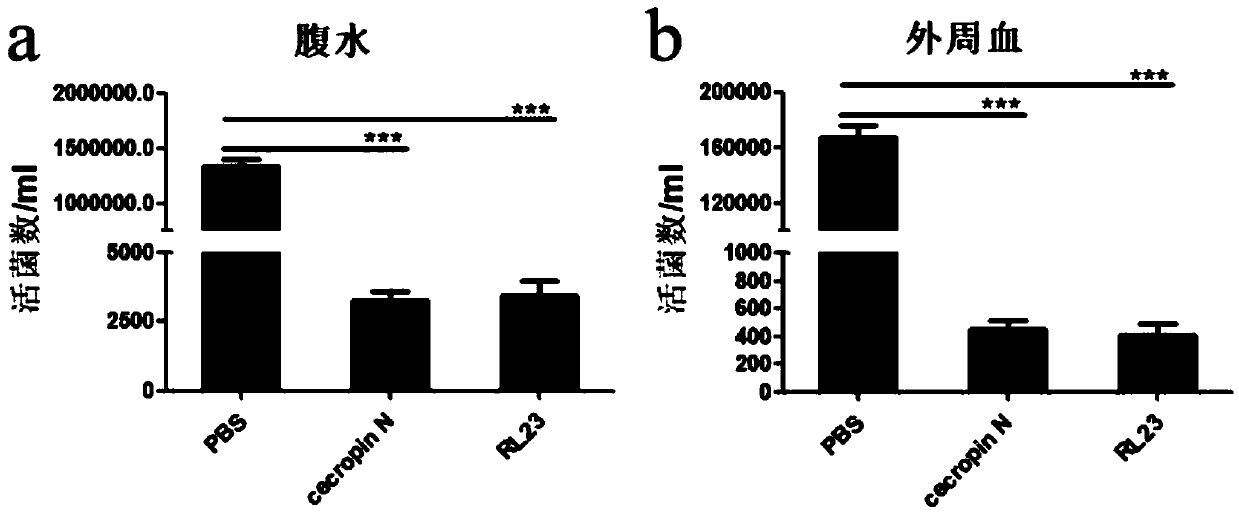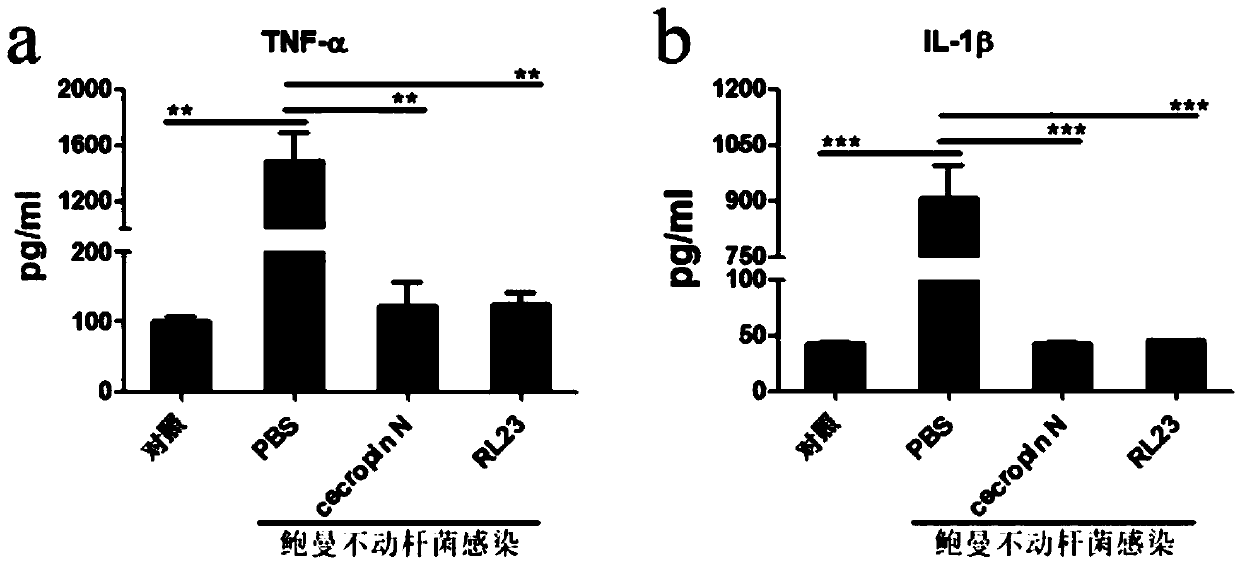Application of cecropin-derived peptide
A technology for deriving peptides and cecropin, applied in the field of biomedicine, can solve the problems of aggravating sepsis, high synthesis cost, and high production cost, achieve good application prospects, inhibit body inflammatory damage, and reduce synthesis costs.
- Summary
- Abstract
- Description
- Claims
- Application Information
AI Technical Summary
Problems solved by technology
Method used
Image
Examples
Embodiment 1
[0028] Example 1: RL23 sequence and its preparation
[0029] In order to reduce the cecropin N derived from Aedes aegypti (GeneBank accession number: AHH41648.1, the amino acid sequence of the mature peptide is RWKFGKKLEKVGKNVFNAAKKALPVVAGYKAL-NH 2 , composed of 32 amino acids, with a molecular weight of 3560.34 Daltons and an isoelectric point of 10.54. It is a straight chain peptide, all amino acids are L-type, and its C-terminus is amidated) in the production cost of application in resistance to drug-resistant bacterial infections , with cecropin N as a template, intercept the N-terminal α-helical domain of the mature peptide, named RL23, and its amino acid sequence is RWKFGKKLEKVGKNVFNAAKKAL-NH 2 (SEQ ID No.1), composed of 23 amino acids, with a molecular weight of 2661.24 Daltons and an isoelectric point of 10.75, is a linear peptide, all amino acids are L-type, and its C-terminus is amidated.
[0030] When synthesizing the RL23 sequence, the entire sequence can be synth...
Embodiment 2
[0031] Embodiment 2: RL23 and cecropin N test and compare the minimum inhibitory concentration of Acinetobacter baumannii
[0032] Add 100 μL LB broth medium to the 96-well culture plate in advance; then add 100 μL diluted polypeptide (cecropin N or RL23) sample to the first well, mix well and add 100 μL to the second well, and perform a series of Two-fold serial dilution; dilute the Acinetobacter baumannii solution to 2×10 5 CFU / mL, then add 100 μL of the diluted bacterial solution to the 96-well culture plate where the peptide sample has been added; shake and mix gently, put the 96-well culture plate at 37°C for 16 hours, and then measure it with a microplate reader Light absorption value at 600nm.
[0033]The results are shown in Table 1. Both the parent peptide cecropin N and its derivative peptide RL23 can effectively inhibit the growth of Acinetobacter baumannii. The minimum inhibitory concentrations of Acinetobacter baumannii were 4.68μg / mL (1.31μM) and 2.34μg / mL (0.6...
Embodiment 3
[0036] Embodiment 3: Acinetobacter baumannii is tested for antibiotic susceptibility
[0037] According to the method of Example 1, the sensitivity of the selected Acinetobacter baumannii strains in Example 1 to antibiotics commonly used in the clinical treatment of its infection was determined. Taking penicillin and gentamicin as representatives, detect the minimum inhibitory concentration concentrations of penicillin and gentamicin to the strains selected in Example 1.
[0038] The results are shown in Table 2, the minimum inhibitory concentration of gentamicin to Acinetobacter baumannii ATCC19606 is 8 μg / mL, but the minimum inhibitory concentration of penicillin to Acinetobacter baumannii ATCC19606 The bacterial concentration was higher than 256 μg / mL. It is worth noting that clinical isolates of Acinetobacter baumannii showed a high degree of resistance to gentamicin and penicillin at concentrations as high as 256 μg / mL. There was no inhibitory effect on the growth of th...
PUM
| Property | Measurement | Unit |
|---|---|---|
| concentration | aaaaa | aaaaa |
| molecular weight | aaaaa | aaaaa |
Abstract
Description
Claims
Application Information
 Login to View More
Login to View More - R&D
- Intellectual Property
- Life Sciences
- Materials
- Tech Scout
- Unparalleled Data Quality
- Higher Quality Content
- 60% Fewer Hallucinations
Browse by: Latest US Patents, China's latest patents, Technical Efficacy Thesaurus, Application Domain, Technology Topic, Popular Technical Reports.
© 2025 PatSnap. All rights reserved.Legal|Privacy policy|Modern Slavery Act Transparency Statement|Sitemap|About US| Contact US: help@patsnap.com



